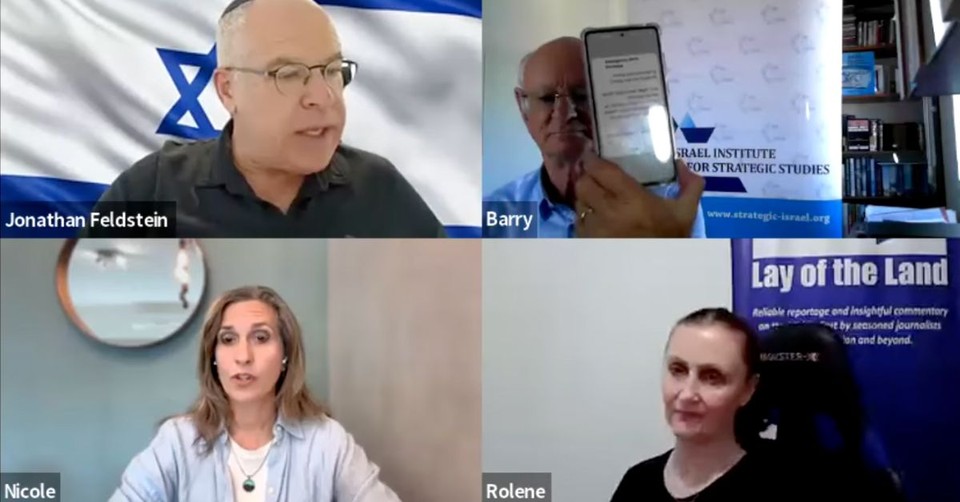Expert Panel on Israel’s War against Iran Interrupted by Iranian Missile Attack

Five minutes into an expert panel discussion and analysis about Israel’s war on Iran, panelists were dispersed, taking cover in their respective bomb shelters, perhaps teaching everything one needs to know about the situation in Israel in light of the seven-day-old attack on Iranian nuclear and military sites and leaders. Continuing the conversation with resilience, the panelists discussed a wide range of topics, shedding light on an array of issues not widely reported outside Israel.
A Modern-Day Parallel to the Six-Day War?
Discussing Israel’s preparation for the conflict with Iran, a decades-long endeavor, it was emphasized that the conflict today is rooted in Iran being an increasing threat since its 1979 Islamic Revolution. The panel highlighted elements of Israel’s extraordinary intelligence and military capabilities that enabled Israel to execute a highly effective and impeccably executed operation, “Rising Lion.” Parallels were made to the 1967 Six-Day War in terms of planning, execution, and broad success, noting that Israel’s preemptive strike on June 13, 2025, was meticulously planned and involved years of intelligence gathering.
Inside the Mission: Intelligence, Air Power, and God’s Protection
These included covert operations within Iran, such as establishing a drone strike base and gathering detailed intelligence on Iranian military leadership and nuclear facilities. “Rising Lion’s” success was bolstered by the prior neutralization of Iran’s proxies, Hezbollah, and Syrian defenses, paving the way for Israel’s air campaign. The coordination of approximately 200 aircraft, air refueling, and ground operations reflected a level of preparedness that was described as “semi-miraculous,” with minimal reported military losses. While the pilots typically get the spotlight, the panelists noted that it could not have happened without the efficiency of Israel’s air controllers, ground crews, and defense systems like Arrow, Patriot, and THAAD, which achieved over 90% effectiveness against Iran’s ballistic missiles.
The Role of Deception and Diplomacy in Israel’s Strike on Iran
Disinformation played a critical role in Israel’s strategy, characterized as a “network of deceptions” that misled Iran and the international community. The speakers highlighted a multi-layered approach, including diplomatic ruses involving negotiations with the United States. Journalist Nicole Jansezian wondered aloud if she may have been used as part of this strategy as well.
Was the Public Rift Between Trump and Netanyahu Part of the Plan?
Prime Minister Netanyahu and President Trump maintained an appearance of discord, with public statements suggesting a push for diplomacy while actually aligning on military action. This was exemplified by Trump’s public insistence on giving Iran “one last chance” for a deal, which masked preparations for the strike. Even public plans for Netanyahu to take a vacation surrounding his son’s wedding were credited as part of the ruse.
Hollywood-Worthy Strategy or Prophetic Timing?
The Mossad’s covert operations within Iran, including infiltrating military and nuclear facilities, were described by Rolene Marks as so sophisticated that they would be deemed implausible even in a Hollywood script. The operation’s secrecy was maintained despite media leaks, such as a report by The Times suggesting an imminent attack, which was downplayed to preserve the element of surprise.
Maj. Elliot Chodoff also noted the unintended advantage of Trump’s perceived erratic behavior, which confused Iran and added to the deception’s effectiveness. Syria’s unexpected permission for Israel to use its airspace was a surprising diplomatic maneuver, further facilitating the operation. Some ridiculed this, however, noting that Syria is not in a place to prevent an Israeli operation inside Syria or transversing its airspace.
What This Conflict Means for Iran’s Future and the Middle East
There were several key successes, with the most significant being the decapitation of Iran’s military leadership and the destruction of some critical nuclear and military infrastructure. The initial strikes targeted high-ranking Iranian generals, including the deputy chief of staff, disrupting command structures within hours. Nuclear facilities like Natanz were hit, with the panel suggesting that Fordow, another key nuclear site, remains a critical target and may be attacked imminently.
Could the Iranian People Rise Up against Their Regime?
“Rising Lion’s” precision, likened to the elimination of Hezbollah’s leadership with pagers, was described as a “historic military feat, which will be studied for generations.” The low civilian and military casualties in Israel, despite expectations of up to 4,000 deaths, were attributed to robust civil defense and missile interception systems. The psychological impact on the Iranian people, with Israel’s messaging explicitly supporting the Iranian people against their regime, potentially sows seeds for internal dissent. The muted criticism from the international community, particularly from moderate Arab states, was seen as a tacit acknowledgment of Iran’s existential threat, even if public gratitude for Israel doing the world’s dirty work and absorbing the losses was lacking.
Is Biblical Prophecy Unfolding before Our Eyes?
Looking forward, the panel expressed cautious optimism tempered by uncertainty. The primary hope is the eradication of Iran’s nuclear and ballistic missile capabilities, with a potential regime change driven by the Iranian people. Chodoff articulated a critical question: whether the Iranian people have the will to sustain enough losses to overthrow the regime, as per his “iron law” that revolutions succeed when rebels are willing to die in greater numbers than the regime is willing to kill.
The panel agreed on the potential for an uprising, given the regime’s weakened state and the historical precedents of protests like the 2009 Green Revolution and 2022 demonstrations following Mahsa Amini’s murder. Jansezian noted the exodus of Iranians fleeing to Turkey and Armenia as highlighting internal instability, also raising concerns about the Islamic Revolutionary Guard Corps’ external operations. Marks envisions a future with “Cyrus Accords,” symbolizing a renewed bond between the Jewish and Iranian peoples, rooted in thousands of years of historical ties. CBN Jerusalem Bureau Chief Chris Mitchell emphasized the biblical significance, referencing Jeremiah 49 and the underground church’s role in Iran’s potential transformation. However, Barry Shaw expressed concern over statements from Israel’s Defense Minister suggesting a focus on neutralizing threats rather than regime change, hinting at possible U.S. influence to preserve the current regime.
Why Believers Should Be Watching and Praying Now
The panel anticipated increased U.S. involvement, potentially with B-52 bombers targeting Fordow, but stressed that the outcome hinges on the Iranian people’s actions and geopolitical dynamics.
All agreed that we are witnessing a profound, transformative, and historic moment that could reshape the Middle East, potentially fulfilling biblical prophecies and fostering peace between Israel and a reformed Iran, one that can see the Islamic regime’s 46-year-old evil influence through its proxies also shrivel and die, leading to a broader peace in the region and the world.
Follow the conversation on “Inspiration from Zion” or on YouTube. Be part of the next update from Israel, a personal briefing and analysis this Saturday at 2:00pm Eastern time.
*The opinions in this commentary do not necessarily reflect those of Crosswalk Headlines.
Photo Credit: ©YouTube/Genesis 123 Foundation
Jonathan Feldstein was born and educated in the U.S. and immigrated to Israel in 2004. He is married and the father of six. Throughout his life and career, he has been blessed by the calling to fellowship with Christian supporters of Israel and shares experiences of living as an Orthodox Jew in Israel. He writes regularly for a variety of prominent Christian and conservative websites and is the host of Inspiration from Zion, a popular webinar series and podcast. He can be reached at firstpersonisrael@gmail.com
Originally published June 20, 2025.







